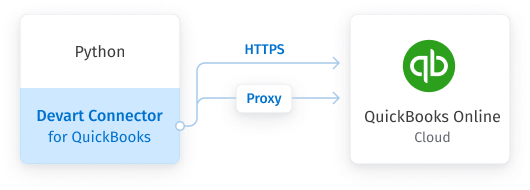Python Connector for QuickBooks Component
Python Connector for QuickBooks is a connectivity solution for accessing QuickBooks Online from Python applications to read and update data.
**FREE DOWNLOAD (v1.3.0)**
File Size: 12.71MB | Safe & Verified
Development And IT
Languages And Scripts
Shareware
Key Features of Python Connector for QuickBooks
- Python Connector for QuickBooks is a connectivity solution for accessing QuickBooks Online from Python applications to read and update data.
- It fully implements the Python DB API 2.0 specification.
- The connector is distributed as a wheel package for Windows and Windows Server.
- Standard SQL syntax The connector fully supports the ANSI SQL standard and lets you execute SQL statements against your QuickBooks data just like you would normally work with relational databases.
- Simple queries are directly converted to QuickBooks API calls and executed on the QuickBooks side.
- Complex queries are transformed into simpler queries, which are then converted to QuickBooks API calls.
- The embedded SQL engine then processes the results in the local cache and applies advanced SQL features from the original complex query.
- Compatibility - Python versions from 3.7 to 3.12 - SQLAlchemy - pandas - petl Supported platforms - Windows 32-bit and 64-bit - Windows Server 32-bit and 64-bit Note: For details on supported OS versions, check the compatibility page of your Python version.
Technical Specifications
- Publisher: Devart.com
- License: Shareware
- Operating System: Windows 7, Windows 8, Windows 10, Windows 11
- Category: Development And IT / Languages And Scripts
Python Connector for QuickBooks Screenshot

User Rating
Based on 365 reviews.